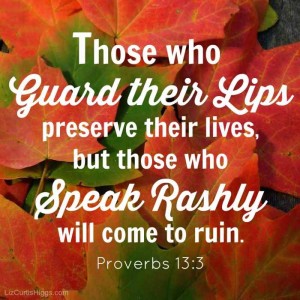A few times (very few), I wish I’d spoken up instead of holding back. But many times (way too many), I wish I’d held my tongue. At home. At work. On a plane. In a restaurant. At church. At a friend’s house…well, pretty much everywhere.
What happens next is seldom good. Words spoken can’t be unspoken.
We may explain, apologize, grovel, beg to be forgiven. But we can’t undo the damage we’ve already done.
Is this a challenge for you, beloved? Right there with you. Keep reading for a word of encouragement.
Those who guard their lips preserve their lives,
but those who speak rashly will come to ruin. Proverbs 13:3

Those who guard their lips… Proverbs 13:3
World War II posters reminded Americans, “Loose lips sink ships.” Now we read on Twitter, “Loose Tweets Sink Fleets.” Either way, it’s wise counsel.
“People who are careful about what they say” (ERV) not only protect themselves; they also guard the safety and well-being of others.
In the book of Proverbs more than a hundred verses teach us about the power of our words to wound or to heal: “The words of the reckless pierce like swords [ouch], but the tongue of the wise brings healing [ahhh]” (Proverbs 12:18).
Planting this truth in my head and heart isn’t enough. I need to educate my mouth as well: “Self-control means controlling the tongue!” (TLB). Right.
Short of taping our lips shut, what can we do?
Here are two exercises that seem to be working.
Stop, look, listen, pray. I not only respond too quickly; sometimes I speak while the other person is still talking. Good grief. My current solution? Stop thinking about how I might answer. Look at their eyes, their expression, their body language. Really listen to what they’re saying. Pray before I offer a response.
When in doubt, say nothing. If you “keep what you know to yourself” (CEV), you’ll stop gossip in its tracks, remain a trustworthy friend, and save yourself and others a ton of trouble. Sometimes I have to literally press my lips together—hard—as I pray for the Lord to rescue me from possible disaster.

…preserve their lives,… Proverbs 13:3
This is God’s saving power at work. Because of His mercy and loving-kindness, the Holy Spirit helps us before we end up in deep water and drag others down with us.
Calling on Him first to zip our lips is far more effective than crying out to Him after we’re drowning in a sea of ill-spoken words.
Our verse from Proverbs promises that, if you control your mouth, “you will be safe” (CEV). Whether you picture a life preserver tossed in your direction or a safety net stretched below you or a fire escape outside your window, guarding your speech insures you will “take another breath” (VOICE) and “have a long life” (NLT).
Such a good plan.

…but… Proverbs 13:3
You’d think the assurance of safety would be enough to keep believers in line. But for some of us, “Careful words make for a careful life” (MSG) doesn’t sound very appealing.
The truth? We like a touch of adventure, a hint of danger, an element of risk. “Careful” sounds…well, boring. Timid. Too safe.
But…we think.
What if…we wonder.
Why not…we decide.
Instead of holding back our thoughts, words, or opinions, we let ’em rip.

…those who speak rashly… Proverbs 13:3
There she blows. The Hebrew word pasaq literally means “open wide.”
This photo doesn’t look like freedom of speech to me. More like a woman out of control. A “big mouth” (GW). A “careless talker” (GNT). The kind of person who “speaks without thinking” (NIRV) and “talks too much” (ISV).
Those who “open their lips” (CEB) often have a hard time closing them. With “no guard on his speech” (DRA), a person is likely to say anything.
When we’re frustrated, we blurt out words we wouldn’t normally say. And when we’re angry, we shout out words we wouldn’t even allow ourselves to think if we were feeling calm and rational.
Then what happens to us and the people we care about?

…will come to ruin. Proverbs 13:3
Families destroyed. Jobs lost. Marriages ended. Bank accounts emptied. Relationships severed.
This isn’t my inner Drama Queen talking: the Hebrew word mechittah means “terror.” The words we speak can do serious damage.
Bet you can think of a time when a sharp rebuke, a blast of vitriol became a weapon of mass “destruction” (ASV) in a household, in a friendship, in a workplace.
It’s a horrible feeling when such things happen. The minute the words explode from our mouths, we realize we’re “done for” (CEV).
Think train wreck: “calamity” (JUB), “evil” (WYC), “ruin” (LEB). This isn’t a calculated attack, meant to inflict injury. It’s a thoughtless remark, “a quick retort” (TLB), nothing more than “careless talk,” (MSG), yet it may well “ruin everything” (NLT).
Okay, now I’m nervous. Maybe we shouldn’t speak, ever. Avoid potential problems. Keep our mouths shut.
But that’s not God’s will for us. He wants us to speak.
Paul confessed, “I am compelled to preach. Woe to me if I do not preach the gospel!” (1 Corinthians 9:16). The Lord urges you and I as well to “teach and admonish one another with all wisdom” (Colossians 3:16), and to “speak as those approved by God to be entrusted with the gospel” (1 Thessalonians 2:4).
Speaking isn’t the problem: it’s controlling our wild and willful tongue. That’s where we need the Holy Spirit’s help.
Heavenly Father, when we open our lips, help us chose our words with care. Temper them with Your love. Fill them with Your grace. Remind us that wrong words lead to disaster, but right words offer everlasting life.
Now it’s your turn
- If you’ve found a way to control your tongue, I’d love to hear it.
Take a moment to Post your Comment below. I have lots to learn on this one. I’m thinking others might too. Thanks for sharing!
Your grateful sister, Liz
@LizCurtisHiggs #50Proverbs
P.S. Your Printable of Proverbs 13:3 awaits you, as well as colorful pins to share on Pinterest. Also on Pinterest this month? Some of my favorite photos and quotes about this splendid season. Happy October!
Looking for a women’s Bible study to prepare everyone’s heart for the holidays? See if this bestseller might be a good fit:
The Women of Christmas
4 weeks / 8 weeks
Free Leader’s Guide






